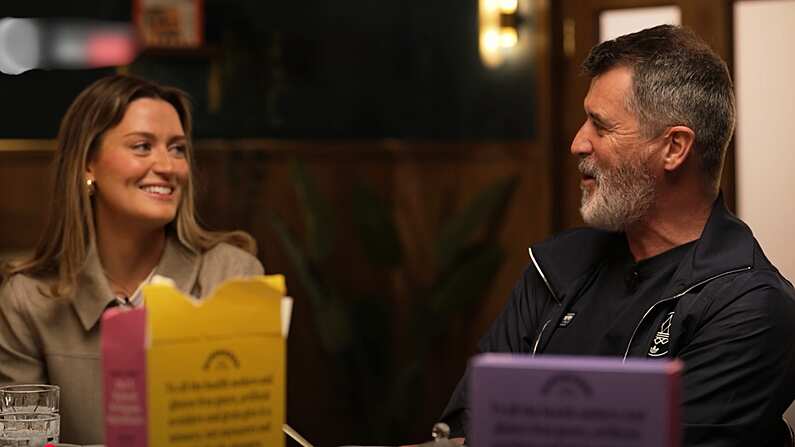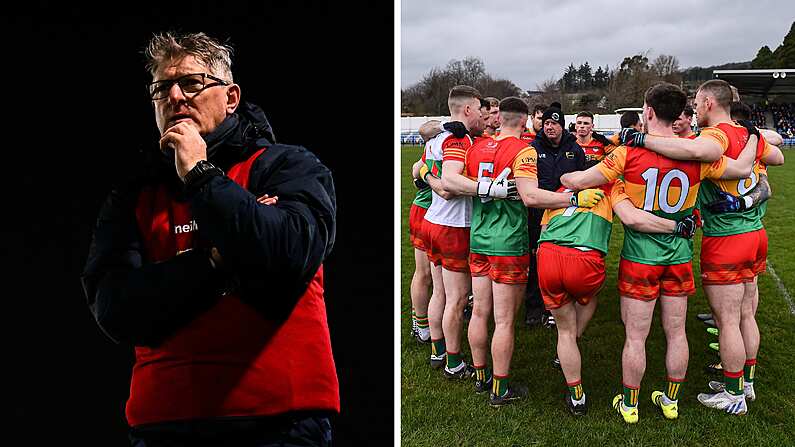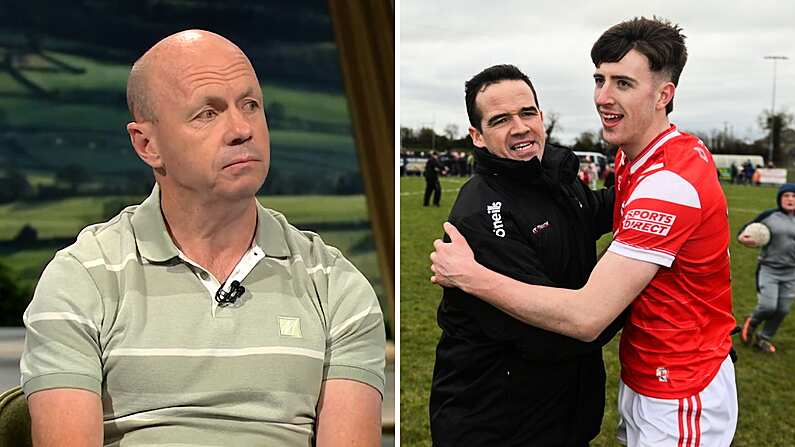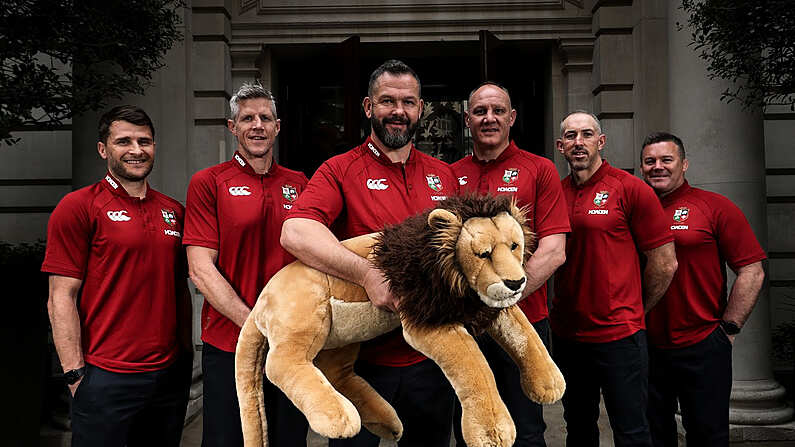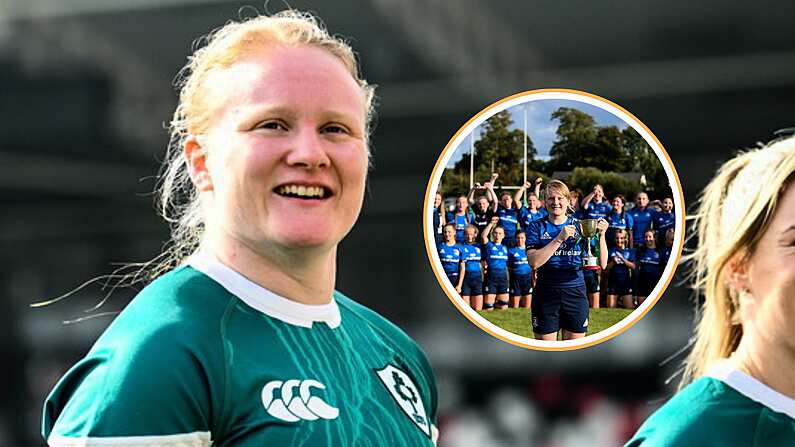Ireland's second Autumn Nations Series match at the Aviva Stadium on Friday night began with an explosive attack but ended with the crowd begging for the final whistle. Ireland, featuring two new caps, burst out of the blocks, scoring twice in the opening five minutes. Their slick attacking play initially left Argentina with no answers.
However, what started as a potentially dominant Irish performance transformed into a nail-biting finish, with the home side desperately hanging on.
How did Ireland go from commanding the game to barely holding on?
In the early exchanges, Ireland looked back to their clinical best, but their inability to maintain that standard through 80 minutes will be a slight worry for captain Doris. The stark contrast between the opening quarter and the closing stages suggests a few issues, particularly around discipline - a recurring theme that continues to plague the team's current performances.
SEE ALSO: The New Look Ireland 23 We Would To See Face Fiji
SEE ALSO: Ireland Player Ratings After Farrell's Men Win Argentina Armwrestle
Ireland’s Attack
Ireland showed improvements in their attack play in the opening half, returning to their trademark multi-option attacking style. Their ability to identify and exploit space showed marked improvement, particularly when capitalising on a startled Argentina in the first quarter.
Mack Hansen's try in the fifth minute perfectly illustrated this clinical approach. The sequence demonstrated excellent structure and execution. It all started with a restart won by Ireland. Jack Crowley sets up the pod system and moves the ball to Henshaw on the right.
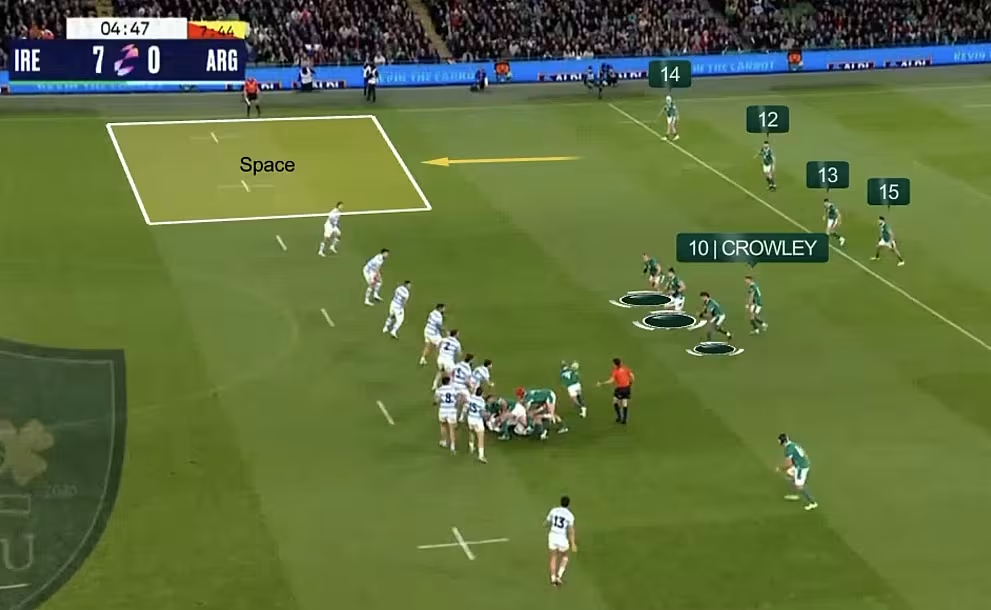
Crowley then organises a 3 man pod outside him, with Keenan behind the pod and Hansen outside of Keenan. Crowley finds Van der Flier who executes a well-timed pass to Keenan, who connects with Hansen. This sequence highlighted Ireland's well-organised pod system, with players working at multiple depths to create attacking options. Crowley also had a crossfield kick option to Lowe on the far touchline.

The attack continued with Ireland's forwards showing excellent work rate, quickly repositioning themselves to punch through the Argentine defence. Despite a momentary confusion when Crowley found himself out of position as Doris attempted an outside pass, Ireland showed their ability to adapt under pressure. When the ball spilled, Ringrose's awareness proved decisive as he picked up the loose ball and carved straight through the Argentine defence and into their 22.

The ball is recycled quickly and an outstanding pass from Gibson-Park finds Beirne, who pops it back inside to Hansen, who glides over for the 2nd try.
Jack Crowley 🎯😍#IREvARG #SUAF ☘️
pic.twitter.com/820QOTvJFG— Munster Rugby (@Munsterrugby) November 15, 2024
Launch Plays from Lineout
Ireland's smart lineout attack was once again on display, particularly their trademark peel plays around the back which remain among the most effective in international rugby. Their opening try stemmed from such a play with Kelleher executing a perfectly timed peel that put Ireland on the front foot. The move's success was amplified by Argentina's defensive frailties, allowing Ireland to capitalize and strike with clinical precision.

Ireland's third try was another well-executed lineout variation. After securing a clean ball off the top, Gibson-Park moves it quickly to Henshaw, who timed his inside ball to Lowe perfectly. Though Lowe was stopped just short of the line, Ireland's quick ball recycling proved crucial. Gibson-Park's awareness to spot McCarthy on the blind side worked, with the forward powering over from close range.

Team discipline
Ireland's disciplinary issues resurfaced again, conceding 13 penalties throughout the match. Again it proved costly, particularly with nine occurring in their half, gifting Argentina four successful shots at goal for a crucial 12 points.
The situation worsened with two yellow cards, further undermining Ireland's performance and undoubtedly frustrating head coach Andy Farrell. Most concerning was the preventable nature of many penalties, an issue that demands immediate attention in the coming week's preparation. The penalty count allowed Argentina to keep the scoreboard ticking over and stay within striking distance, despite Ireland's superior attacking play.

Just 2 games into this series of games and Ireland have amounted 26 penalties. Finley Bealham has given away 4 penalties, while Tadhg Beirne is up to 3.

The Final Quarter
A concerning pattern has developed in Ireland's recent performances, particularly their execution in the last quarter of games. Friday's failure to register any points in the second half highlights a worrying trend that needs addressing.
Statistics from the last six games show that Ireland has consistently been outscored in both the third and fourth quarters. Even more alarming is their complete scoring drought in the final quarter in three of these six games.
This drop-off in performance during crucial game periods represents a significant shift for a team known for its ability to close out games. The pattern suggests potential issues with maintaining intensity and execution throughout the full 80 minutes, an area Andy Farrell will need to address urgently as the team moves forward.

The contrast in Ireland's scoring patterns is stark: 41 points were scored in the opening quarter compared to just 23 in the final quarters in the last 6 games. More concerning still is the defence late in games, having conceded 41 points in that last quarter.
Whether the root cause lies in the game plan, players conditioning levels, or the impact off the bench, identifying and addressing this issue demands immediate attention from Farrell and his coaching team.
Fiji this week and back to a more traditional Saturday afternoon game. Farrell has a great opportunity to address some of the recent issues and an opportunity for some of the wider squad. Expect Cian Healy to move his international caps to 134, which will be the record number for an Irish play. It is an incredible achievement for an incredible player, who first appeared for Ireland 15 years ago.




